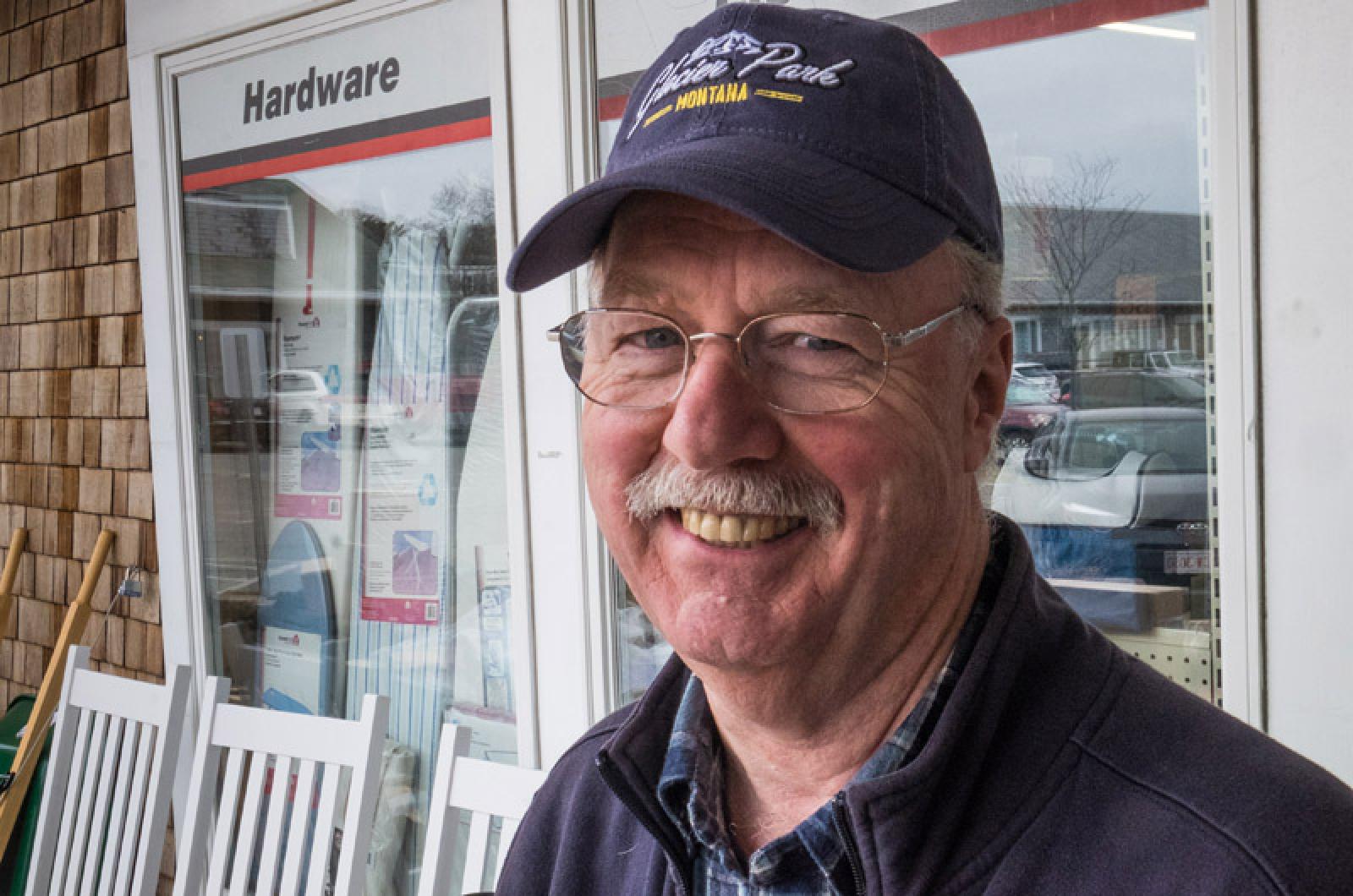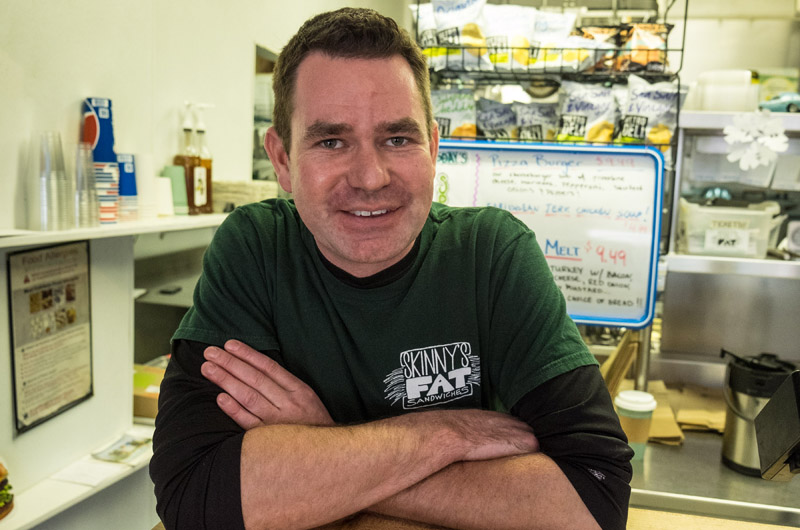As business owners prepare for another summer, a proposed single-use bag ban has drawn mixed opinions from those most immediately affected. Selectmen in five Island towns have agreed to add the proposal to their annual town meeting warrants, but last week Oak Bluffs selectmen decided not to bring it to a vote this spring.
While merchants in Oak Bluffs cited financial concerns about the ban, some other businesses around the Island said the measure would not have much of an effect or that they would adjust to the changes and move on.
Alex King, owner of Skinny’s Fat Sandwiches in Oak Bluffs and Edgartown, said he wasn’t worried about making the switch. The shop uses plastic bags for salads and drinks and the ban would apply only to bags thinner than four-thousandths of an inch, which cost about two cents apiece. Thicker bags, which can be reused, would cost about four cents, Mr. King said.
“That is not going to hurt any business no matter how many they use,” he said.
Andy Krickl, general manager of Granite Ace Hardware in Edgartown, which has a large inventory of home and garden products, said he would like to return to the days before plastic bags, but worried about the effect on customers and the bottom line.
“In the grocery store industry, it’s easier for them to make the switch because most of their product is of small size,” he said. “But in our situation, people come in and they might buy a pillow. They want it in a bag.” He also noted that elderly customers often appreciate bags with handles.
“Any retailer, up to a point, can absorb things, but there is a certain point where it has to be passed on to the customer,” he said. “That just adds to the price of things, and if we can keep it down, that would be great.”
Across the sound, on Nantucket, a plastic bag ban went into effect in 1990. Town manager Elizabeth Gibson told the Gazette that the ban has caused little concern over the last 25 years.
“It’s pretty well established that we don’t use plastic bags,” she said, adding that in her many years in town government, she has never heard a complaint. “I think it’s been good for the island.”
Nantucket’s ban is more stringent than the one proposed for the Vineyard, including all plastic and polystrene products supplied by vendors.
Annye’s Whole Foods, which opened on Nantucket in 1999, pays about $55 per case of large grocery bags, but also collects bags from its customers and reuses them at the store. A regular 70-pound grocery bag is good for at least five or 10 uses, store clerk Mandy Shannon said, adding that she often has a surplus from the island’s two Stop & Shop locations. About 35 per cent of Annye’s customers bring their own reusable bags throughout the year, she said.
“Using a paper bag is fine for produce,” she added. “It’s what you get used to.”
Ms. Shannon said that the ban has become a part of the island culture, and was even a source of pride. “I can’t speak for any other store, but we would never go back to plastic,” she said.
Cronig’s Markets in Vineyard Haven and West Tisbury have never used plastic bags in their 99-year history — a practice that owner Steve Bernier said reflects the interests of the business and its customers. The store has also gotten rid of polystyrene meat trays, and last year stopped carrying balloons, glow sticks, cigarettes, and polystyrene cups and plates in response to customer demand.
“We are trying to clean up our act,” Mr. Bernier said. “We are just trying to find the best way to do it.”
Customers now pay five cents per paper bag in the checkout line, with each bag costing the store about 12 cents. Cronig’s also sells store-branded canvas tote bags.
Carol McManus of Espresso Love in Edgartown said she has long worried about the effect of plastic bags on the environment and would be happy to make the switch.
“You can get into the habit of keeping bags in your car to reuse,” she said. “It’s not a big deal. For the environment and for the planet, I think plastic is awful.” She noted that in France, where she visits each year, some stores carry no bags at all. “They are way ahead of us,” she said.
Bob Pacheco, owner of Reliable Market in Oak Bluffs, said that the switch to plastic “would greatly increase our overhead.” The store goes through about half a million plastic bags a year, at a cost of around $14,000. Mr. Pacheco said switching to paper would cost $85,500, an increase of 510 per cent.
“It all adds up,” said Mr. Pacheco, noting the cost of labor and other factors in running a business. “This is just one piece of the overhead that you try to control as much as you can.”
In addition to having more businesses than other towns, he said Oak Bluffs is largely a walking community, so plastic bags may be more appropriate.
Reached by phone this week, selectman Gail Barmakian said the proposal had emerged early in the warrant process, and that some issues had yet to be considered.
According to the minutes of the Dec. 15 meeting at which the ban was discussed, the selectmen had voted to support the draft bylaw, send it to town counsel for review, and later consider it for a town vote.
Vineyard Conservation Society member Samantha Look, who spearheaded the ban proposal, said the town was already finalizing the article prior to last week’s meeting. A petition with 10 signatures would have been enough to get the bylaw on the warrant regardless of selectmen approval, but the deadline for petitions had already passed. A petition with 200 signatures could now bring the article to a special town meeting vote, but Ms. Look doesn’t favor that route.
“They have a path for how they would like to do this,” she said of the selectmen. “We are not going to force the issue.”
The selectmen planned to form a committee for further study, and Ms. Barmakian said the bylaw could still be amended to accommodate local concerns. “There are just so many different ways you could write it and still try to keep with the intent of the bag issue,” she said.
Ms. Barmakian added that there may be opportunities for compromise in Oak Bluffs, such as a collection program so more single-use plastic bags can be recycled, and increased education.
On March 30, VCS will hold another information session at the Edgartown Library.





Comments (18)
Comments
Comment policy »